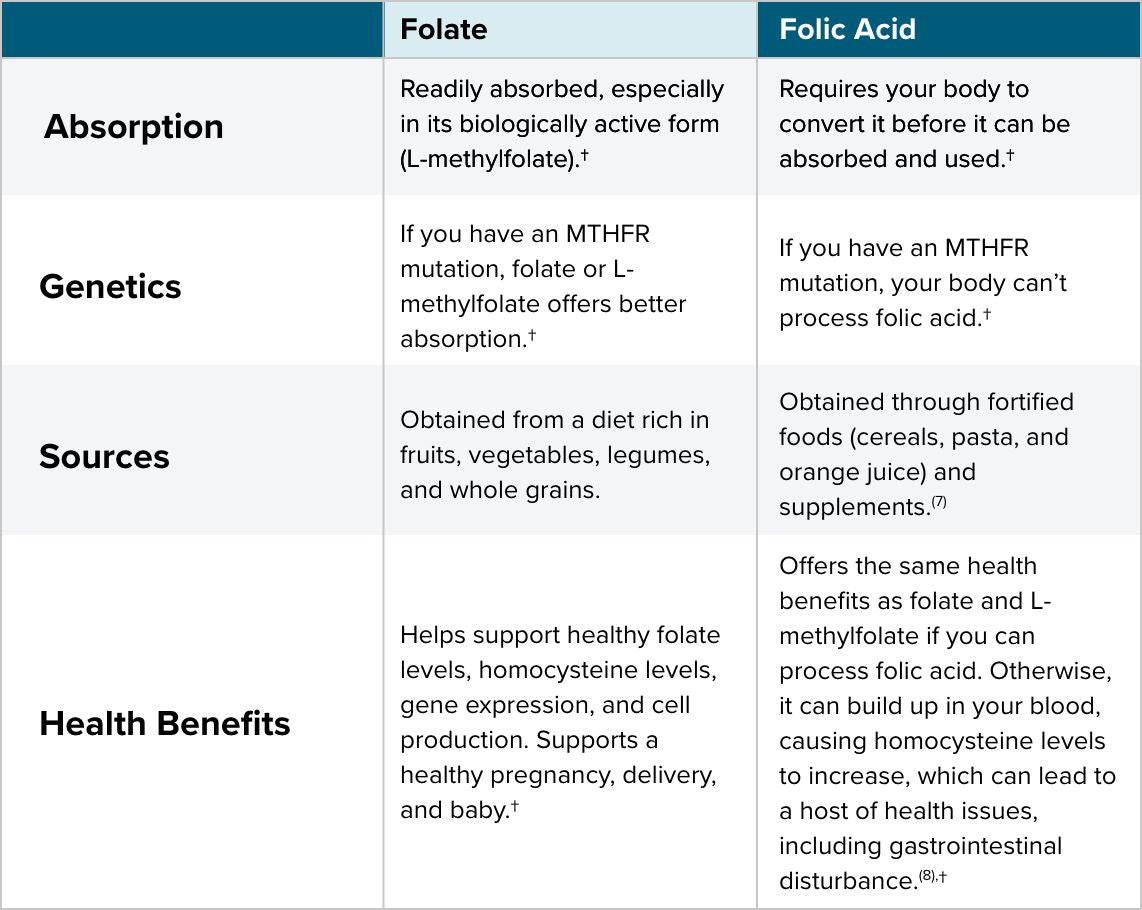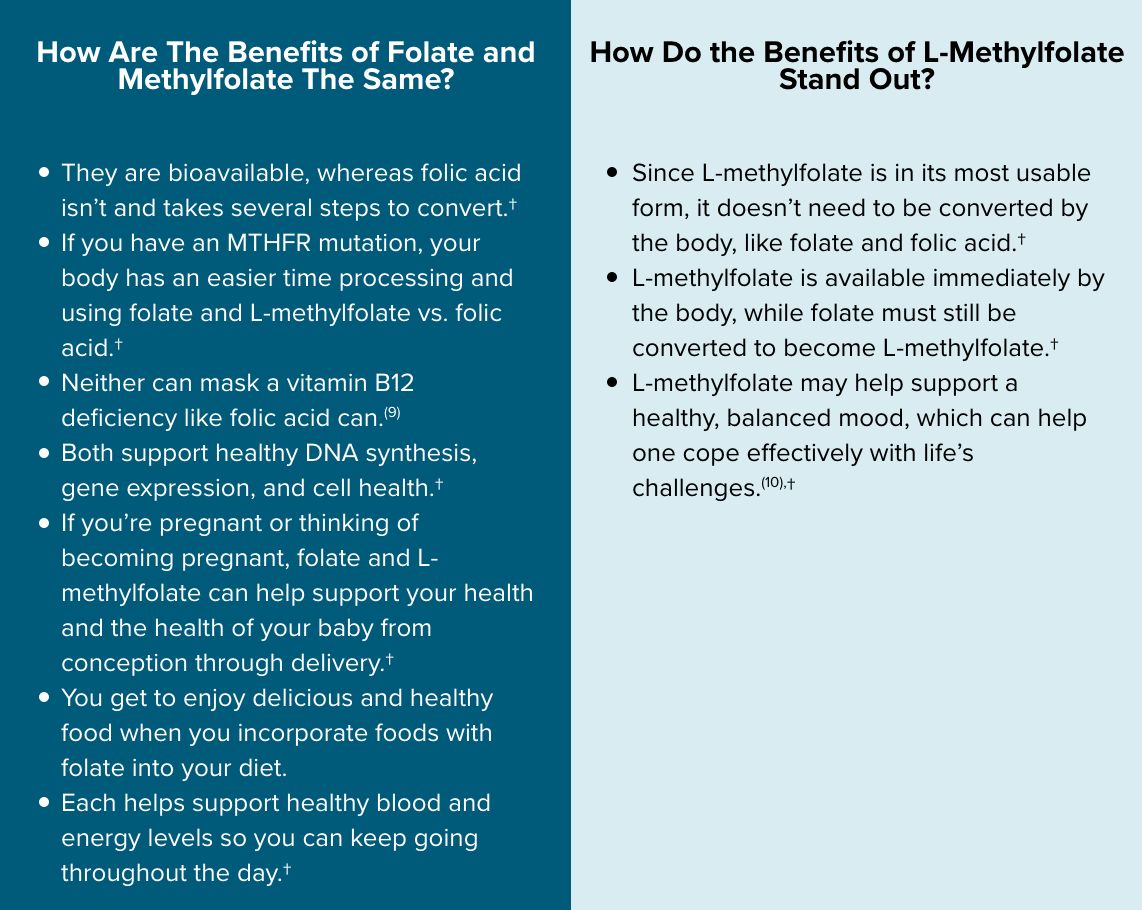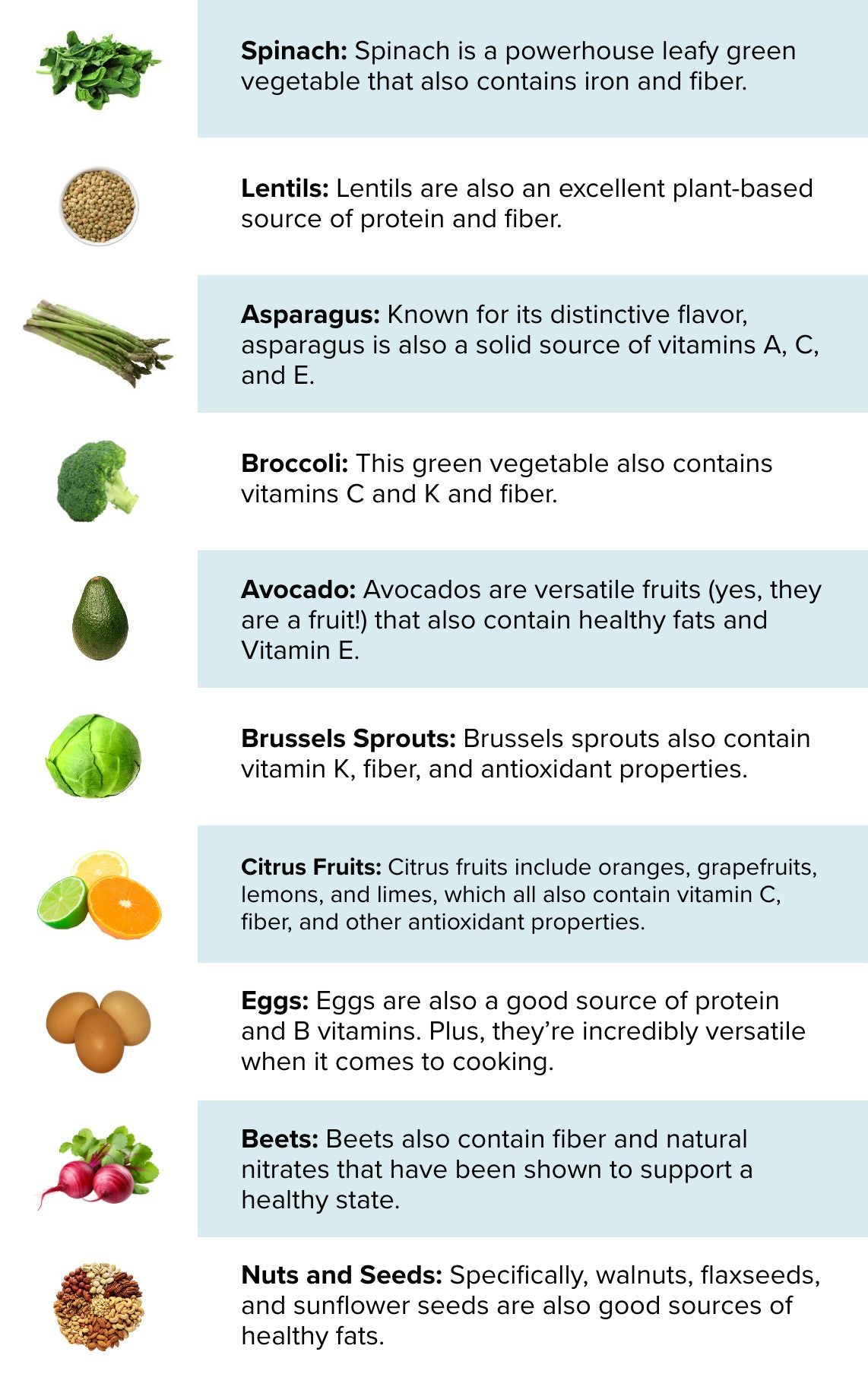What Are Folate, L-Methylfolate, and Folic Acid?
Folic acid, folate, and L-methylfolate sound similar—they are often used interchangeably. However, these compounds are not quite the same. All three support critical processes like healthy DNA and RNA production, cell growth, nervous system functioning, and fetal development during pregnancy.(1)† But they work in distinctive ways because of where they come from and how your body processes them.
We’re here to help unravel what this all means and how you can support your health and well-being by choosing the suitable form of folate based on your unique needs.†
Folate
Folate is a type of vitamin B9 that occurs naturally in foods like leafy greens, broccoli, Brussels sprouts, fruits, beans, and animal liver. Folate is bioavailable. Once it enters your digestive system, it’s immediately converted to its bioactive form—5-MTHFR or L-methylfolate—in your small intestine. In its active form, folate supports the healthy breakdown of homocysteine. This breakdown enables your body to use the amino acid for chemical processes throughout your body, like the elimination of nitric oxide.(2) Folate is also critical to supporting processes like methylation, healthy gene expression, DNA synthesis, and cell division, especially during pregnancy.(3,4) This is why it’s typically included in prenatal supplements.†
L-Methylfolate
L-methylfolate is the active form of folate that your body uses immediately without any conversion—it’s already in the proper form to start working. It’s like a VIP pass that allows vitamin B9 to skip the line and get straight to work in your body. It may help you to think of folate as a raw material found in foods like spinach, avocado, and citrus. Your body needs to go through a bit of a process to turn folate into a form it can use, L-methylfolate. Your body can then use L-methylfolate immediately without any extra work.†
L-methylfolate is especially useful if you have an MTHFR mutation. An MTHFR mutation can stop your ability to convert folic acid to its usable form.(5) If you have a mutation, taking an L-methylfolate supplement can help support healthy levels of B9. This is essential because folate is pivotal in supporting the healthy synthesis and repair of DNA, cellular division, and creation of red blood cells, among other critical biological functions.†
Folic Acid
Folic acid is the synthetic form of folate. Foods like cereals, pasta, and orange juice are often “fortified” with folic acid. Folic acid is also found in supplements. However, it's not bioavailable in the way folate is. Once you ingest folic acid, it has to go through several enzymatic reactions in your liver and other tissues before it can be used throughout your body. This process is less efficient than it is for folate. It can also vary significantly from person to person due to genetic differences, like an MTHFR mutation. In that case, you can have too much homocysteine in your blood, which can lead to various health problems like heart and circulatory system issues, nervous system issues, and pregnancy complications.(6)

Folate vs Folic Acid: Which Is Better?
Understanding the pros and cons of folate vs. folic acid is essential for keeping your body healthy. It's even more critical if you're pregnant or planning to become pregnant.
Folic acid and folate help support your health whether or not you're pregnant. But remember: folate and L-methylfolate are bioavailable, while folic acid isn't. This is something you must consider if you have an MTHFR mutation. Your healthcare practitioner may recommend a folate or L-methylfolate supplement. They may also suggest you incorporate foods that naturally contain folate into your diet. These actions can ensure you're supporting healthy folate levels.†

The choice is yours, depending on your current needs and health situation. However, you should speak with your healthcare provider to ensure you make the best decision possible. If you are concerned about having an MTHFR mutation, they can run tests to determine if you do. Or, if you already incorporate folate into your daily routine and aren’t feeling well, you may be experiencing side effects. Your healthcare practitioner can help you figure out what’s happening.
What Are the Benefits of Folate vs I-Methylfolate?
If you've ruled out folic acid and want to know how folate and L-methylfolate compare, you need to understand what they both do and how they differ.
Here's a breakdown that might make it a bit easier to grasp:

Understanding the benefits, similarities, and differences of folate vs. L-methylfolate helps you make better health choices. It can also start the conversation with your healthcare practitioner about supplementation. Keeping your body and mind in great shape is a big deal. Knowing about folate and L-methylfolate can help.
What Is the Use of I-Methylfolate in Pregnancy?†

L-Methylfolate is an essential nutrient when having a baby. It supports pregnancy health from pre-conception through to delivery and breastfeeding. Supplementing with L-methylfolate while pregnant also supports healthy red blood cell (hemoglobin) production. Having healthy hemoglobin levels supports healthy blood during pregnancy.(11) It also gives your baby the best start possible.†
Here are other ways that supplementing with L-methylfolate helps during pregnancy by supporting the following:†
- Healthy neurological development so your baby gets the nourishment needed to support a normal and functional brain and spine.
- DNA synthesis and repair, which are the foundations of life.
- Healthy red blood cell production so your baby gets the oxygen it needs while developing.
- A balanced mood and the normal production of serotonin and dopamine so you feel the best you can during pregnancy and postpartum.
- Normal fetal growth and development so that normal development and strong teeth and bones are supported.
How Can I Get Folate and L-Methylfolate Naturally?
Getting enough folate is essential for your body, especially if you want to have a baby. The good news is that you can find folate and L-methylfolate naturally in many tasty and healthy foods. A diet full of folate is essential if you want to eat the right foods to support an MTHFR mutation. These foods are a great way to ensure you get the necessary folate.
Here are ten foods that are excellent sources of natural folate:12

The Mediterranean diet, full of fruits, vegetables, nuts, and whole grains, provides essential nutrients.(13) This diet, celebrated for its nutritional balance and focus on plant-based foods, supports overall health and folate intake. Sticking to a diet and knowing which foods to add to your daily menu makes meal planning and preparation easy. You can shop for what’s healthy and steer clear of ultra-processed and sugary foods that provide short-term satisfaction but no long-term benefits.
Seeking Health’s L-Methylfolate Supplements
Seeking Health has several L-methylfolate support supplements that can help you get enough bioavailable folate to support healthy gene expression, cell production, and function. Some of these supplements contain folinic acid. Folinic acid takes a few additional enzyme steps before methyl groups are formed and then released for your body to utilize. This slower delivery can provide relief and comfort to those sensitive to methylated nutrients.†
Seeking Health’s L-methylfolate supplements are also designed to provide support if you have an MTHFR mutation and must pay special attention to your folate needs to support healthy methylation.†
- L-Methylfolate offers powerful methylation, MTHFR, homocysteine, and support for healthy genetic expression.†
- Methyl B12 with L-Methylfolate (Formerly Active B12 with L-5-MTHF) is available in a well-absorbed lozenge. It offers B12 with active, methylated folate to support optimal mental clarity and brain health.†
- Folinic Acid Lozenges are tasty and well-digested to support healthy methylation, homocysteine levels, cognition, and a balanced mood.†
- Hydroxo B12 with Folinic Acid provides potent, methyl-free B12 and folate that supports healthy homocysteine levels and cardiovascular function.†
- Prenatal Essentials offers pregnancy support in a two-capsule serving. It contains bioavailable B12 and folate to support healthy methylation and DNA expression, promoting the healthy development of your baby’s brain, spinal cord, and immune system.†
The Bottom Line

Navigating the world of nutrients like folate, L-methylfolate, and folic acid can seem confusing. But understanding the basics is crucial for your health. Whether you choose L-methylfolate for its direct benefits—especially if you have an MTHFR mutation—or opt for a diet full of folate from foods like spinach and avocados, your choices can have a significant impact. And if you're planning on getting pregnant or are already expecting, you're giving your baby the best start at life by incorporating folate into your daily diet.†
Remember, each form of folate has its place and benefits, but the key is to know what your body needs to thrive. By staying informed and making conscious health decisions, you can support your body's needs at every stage of life. Your actions today support your ability to remain as healthy and vibrant as possible.
References
- https://medlineplus.gov/ency/article/002408.htm
- https://my.clevelandclinic.org/health/articles/21527-homocysteine
- https://pubmed.ncbi.nlm.nih.gov/22332098/
- https://pubmed.ncbi.nlm.nih.gov/26272218/
- https://pubmed.ncbi.nlm.nih.gov/32887268/
- https://my.clevelandclinic.org/health/articles/21527-homocysteine
- https://www.fda.gov/food/nutrition-facts-label/folate-and-folic-acid-nutrition-and-supplement-facts-labels
- https://pubmed.ncbi.nlm.nih.gov/24944062/
- https://pubmed.ncbi.nlm.nih.gov/34634124/
- https://pubmed.ncbi.nlm.nih.gov/33652997/
- https://pubmed.ncbi.nlm.nih.gov/21440300/
- https://ods.od.nih.gov/factsheets/Folate-HealthProfessional/
- https://pubmed.ncbi.nlm.nih.gov/28818086/
† These statements have not been evaluated by the Food and Drug Administration (FDA). This product is not intended to diagnose, treat, cure, or prevent any disease.












